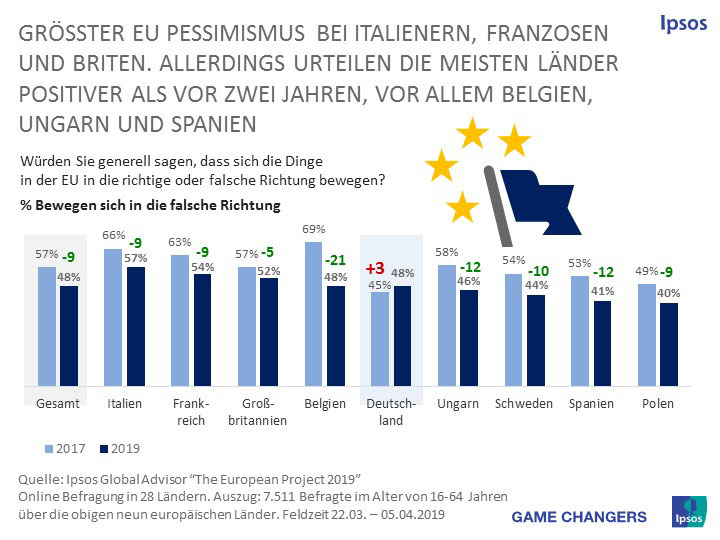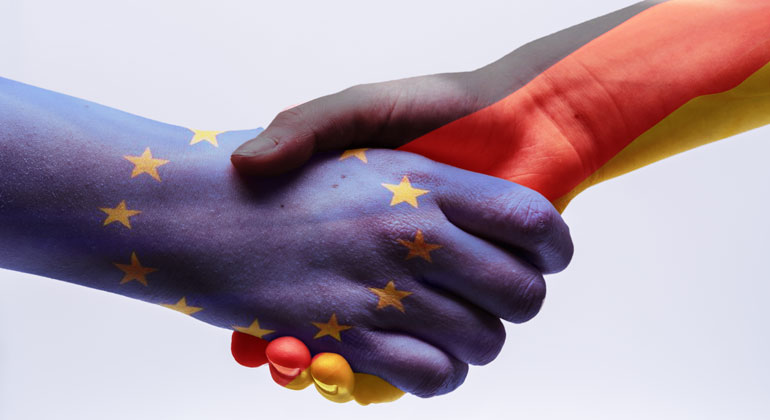Attitudes to Europe on the eve of the 2019 European Elections
New Ipsos global study shows nearly half of people in 10 European countries think things across the EU are on the wrong track – but less pessimistic than in 2017. 44% say they are not very interested in the upcoming European Parliament elections. Worldwide, half think the European project as a whole has made Europe stronger.
Half of Europeans across 10 countries believe things across the European Union are on the wrong track, according to a new Ipsos poll. The new online poll conducted amongst adults aged under 75 in 28 countries worldwide, including Belgium, France, Great Britain, Germany, Italy, Spain, Hungary, Poland, Serbia and Sweden in Europe, shows 48% say things across the European Union are off on the wrong track, although this is an improvement from 57% two years ago. This compares with just over a quarter (28%) saying things are heading in the right direction (up 7 points) and another quarter (25%) who say they’re unsure. The most pessimistic countries are Italy (57% wrong track), France (54%), and Britain (52%), while Poland (40%) and Spain (41%) are less negative. Nevertheless, with the exception of Germany each country has become less pessimistic than in 2017.
The European Union today
Furthermore, the survey also shows that nearly half of Europeans (45% on average across the ten countries) believe that the rules of the EU are rigged to advantage the rich and powerful, with aspiring member state Serbia (65%) most likely to believe this followed by Belgium and Italy (both 50%) – those in Poland and Sweden are least likely to think this (both 38%). Half (52%) also believe that the leaders of the EU don’t care about people like them with Serbia (58%), Belgium (57%) and France (56%) most likely to believe this and Germany (48%) and Poland (47%) least likely.
The survey also shows:
- Less than half of Europeans say they know much about the advantages of EU membership (42%) – although even fewer feel they know much about its disadvantages. Britons are the most likely to feel well informed about both the advantages and disadvantages of EU membership – the French and Spanish the least.
- Europeans are less negative than they were in 2017 as to whether the European Union made the effects of the economic crisis better or worse. Now just one in four say the EU made the crisis worse in their country (26%, compared with 36% in 2017); 27% think the EU mitigated the impact of the crisis. Hungarians are most likely to think the EU helped reduce the effects of the economic crisis (49%), while Italians are most likely to say it made things worse (47%).
The European Parliament Elections
With the European Parliamentary elections on the horizon, the new Ipsos poll reveals half (50%) of the public in the nine EU countries say they are interested in the upcoming elections (44% say they’re not). Italy, Poland and Hungary are the countries with the most interest (65%, 63%, and 56% respectively) while the French, Belgians and the British are among the least interested (44%, 41%, and 36% respectively). On the elections the survey also finds:
- Europeans are split on whether they think anti-European movement parties will win the elections, with roughly a quarter (23%) saying they will win and another quarter (24%) saying they won’t – the number saying they will win jumps to 42% in Italy.
- One in three (35%) agree that in the European elections it’s too risky to elect new political parties with radical ideas for change (21% disagree) with Belgium (41%) and Germany (39%) finding it most risky.
- Support for traditional parties however is also low with just 16% saying voters should stick with political parties who have been in power before (35% disagree). Hungary (49%), Italy (39%), Belgium (39%) and France (38%) are most negative towards established parties.
- Overall just half (51%) of Europeans correctly know that members of the European Parliament (MEPs) are directly elected by the citizens of each member state they represent. Hungarians (65%) and Polish citizens (63%) are most likely to know this while Germans (43%) and Belgians (41%) are least likely.
Overall, there is little enthusiasm for the way democracy works in the EU, and often even less for the way it works in people’s own countries. Across the ten European nations, on average people are largely split on their satisfaction levels with the way democracy works in the EU with three in ten (29%) saying they’re satisfied and 31% saying they’re dissatisfied (40% say they don’t know). Those in Poland (46%) are the most satisfied with EU democracy, while those in Italy (25%), Britain (25%) and France (19%) are the least. Despite low levels of satisfaction with democracy in the EU, levels of satisfaction within the public’s respective countries is often lower. A quarter (26%) say they’re satisfied with how democracy works in their country while 44% say they are dissatisfied. Sweden (41%) and Germany (36%) are the most satisfied with how democracy works in their country with Serbia (17%) and Hungary (16%) the least satisfied.
Has the European project been a success?
The new Ipsos survey also asked participants to take a long view about the success of the European project since 1957. Across all 28 countries worldwide, people think the European project has had more successes than failures (by 29% to 15%), through since 2017 there has been a rise in those thinking the successes and failures balance out (from 26% to 32%). Poland (43%) and Hungary (40%) are the most positive nations within the EU, with Belgium (19%), Italy (18%) and France (17%) being the least.
Taking everything into account, half worldwide (51%) think the European project has made Europe stronger today than it would have been without it and 14% think that it’s made Europe weaker. Within the EU, those in Poland (62%) and Sweden (58%) are most likely to say the EU has made Europe stronger while those in Italy (37%) and France (31%) are least likely to say this. Countries in the EU on average though tend to be a bit more critical than those in the rest of the world (by 19% to 11%); in particular India, South Africa and countries in Latin America are more positive about the impact of the European project.









